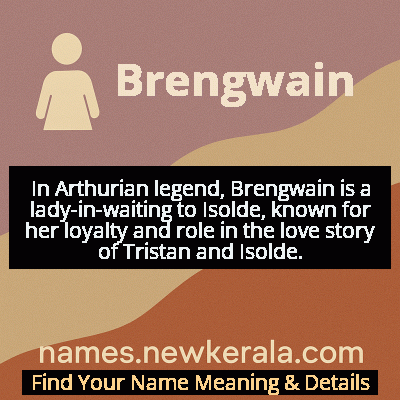Brengwain Name Meaning & Details
Origin, Popularity, Numerology Analysis & Name Meaning of Brengwain
Discover the origin, meaning, and cultural significance of the name BRENGWAIN. Delve into its historical roots and explore the lasting impact it has had on communities and traditions.
Name
Brengwain
Gender
Female
Origin
Arthurian
Lucky Number
3
Meaning of the Name - Brengwain
In Arthurian legend, Brengwain is a lady-in-waiting to Isolde, known for her loyalty and role in the love story of Tristan and Isolde.
Brengwain - Complete Numerology Analysis
Your Numerology Number
Based on Pythagorean Numerology System
Ruling Planet
Jupiter
Positive Nature
Optimistic, inspirational, and creative.
Negative Traits
Scattered, exaggerating.
Lucky Colours
Yellow, gold, purple.
Lucky Days
Thursday.
Lucky Stones
Yellow sapphire.
Harmony Numbers
1, 2, 9.
Best Suited Professions
Arts, writing, communication.
What People Like About You
Creativity, optimism.
Famous People Named Brengwain
Brengwain of Cornwall
Lady-in-waiting
Faithful companion to Iseult in Tristan legend
Brengwain the Loyal
Court attendant
Key figure in medieval Arthurian romances
Lady Brengwain
Noble attendant
Guardian of secrets in Tristan and Iseult story
Name Variations & International Equivalents
Click on blue names to explore their detailed meanings. Gray names with will be available soon.
Cultural & Historical Significance
The character of Brengwain represents the ideal of feminine service and loyalty in medieval court culture, exploring complex themes of duty, morality, and female agency. In Richard Wagner's opera 'Tristan und Isolde', her role as Brangäne emphasizes the tension between her duty to protect Isolde and her complicity in the forbidden romance. Brengwain's narrative arc reflects medieval attitudes toward female friendship and the often-underestimated power of women in supporting roles. Her story continues to resonate because it examines the moral complexities faced by those who serve powerful figures, balancing personal ethics with professional obligations in a world where women's choices were often severely constrained.
Extended Personality Analysis
Individuals bearing the name Brengwain typically exhibit profound loyalty and unwavering commitment to their chosen people or causes. Like their Arthurian counterpart, they possess a strong moral compass combined with practical wisdom, enabling them to navigate complex ethical dilemmas. These individuals are characterized by their discretion and reliability, often serving as the confidential keepers of others' secrets and troubles. They demonstrate exceptional emotional intelligence, able to read situations and people with remarkable accuracy. Their loyalty is not passive but actively expressed through protective behaviors and thoughtful interventions.
Brengwains embody quiet strength and resilience, often functioning as the stabilizing force in relationships and organizations. They're natural problem-solvers who approach challenges with creativity and determination, much like the original Brengwain who devised clever strategies to protect Iseult. While they may avoid the limelight, their influence is significant through the trust they inspire and the support they provide. This personality type combines traditional virtues of honor and service with modern understanding of personal boundaries and self-care. They're often the foundational element in successful partnerships and teams, providing the consistency and trustworthiness that enables others to flourish. Their strength lies in their ability to be both steadfast and adaptable, loyal yet independently minded.
Modern Usage & Popularity
In contemporary naming practices, Brengwain remains an extraordinarily rare choice, primarily embraced by Arthurian enthusiasts, historical fiction aficionados, and parents seeking unique mythological names with strong female associations. The name has never registered on official baby name charts or databases, positioning it as a truly distinctive selection for those wanting to avoid popular trends. Its usage is largely confined to literary circles, historical reenactment communities, and families with particular interest in Celtic or medieval heritage. The name's phonetic complexity and unconventional spelling present challenges for everyday use in modern society, yet these same qualities appeal to parents valuing literary depth and cultural significance. With growing interest in mythological names and increased visibility of Arthurian stories through recent media adaptations, Brengwain may experience slight growth in recognition, though it's destined to remain a niche choice cherished for its connection to themes of loyalty, intelligence, and feminine strength in supporting roles.
Symbolic & Spiritual Meanings
Brengwain symbolizes the profound power of loyalty and the essential, though often invisible, strength of supporting characters in life's narratives. She represents the concept that true influence doesn't always manifest through leadership positions but can be exercised through steadfast support and protection of others. The name carries deep connotations of discretion, service-oriented wisdom, and the ethical complexity inherent in balancing personal morality with external duties. Symbolically, Brengwain embodies the archetype of the empowered handmaiden—not as subordinate, but as someone who wields significant power through her loyalty, intelligence, and strategic thinking. She represents the connective tissue between people, the guardian of secrets, and the stabilizing force that maintains relationships and social structures. Her legacy symbolizes how ordinary individuals, through their commitment to others and their intelligent application of loyalty, can become extraordinary influences who shape outcomes from behind the scenes, reminding us that the most powerful forces are sometimes the quietest and most consistent.

